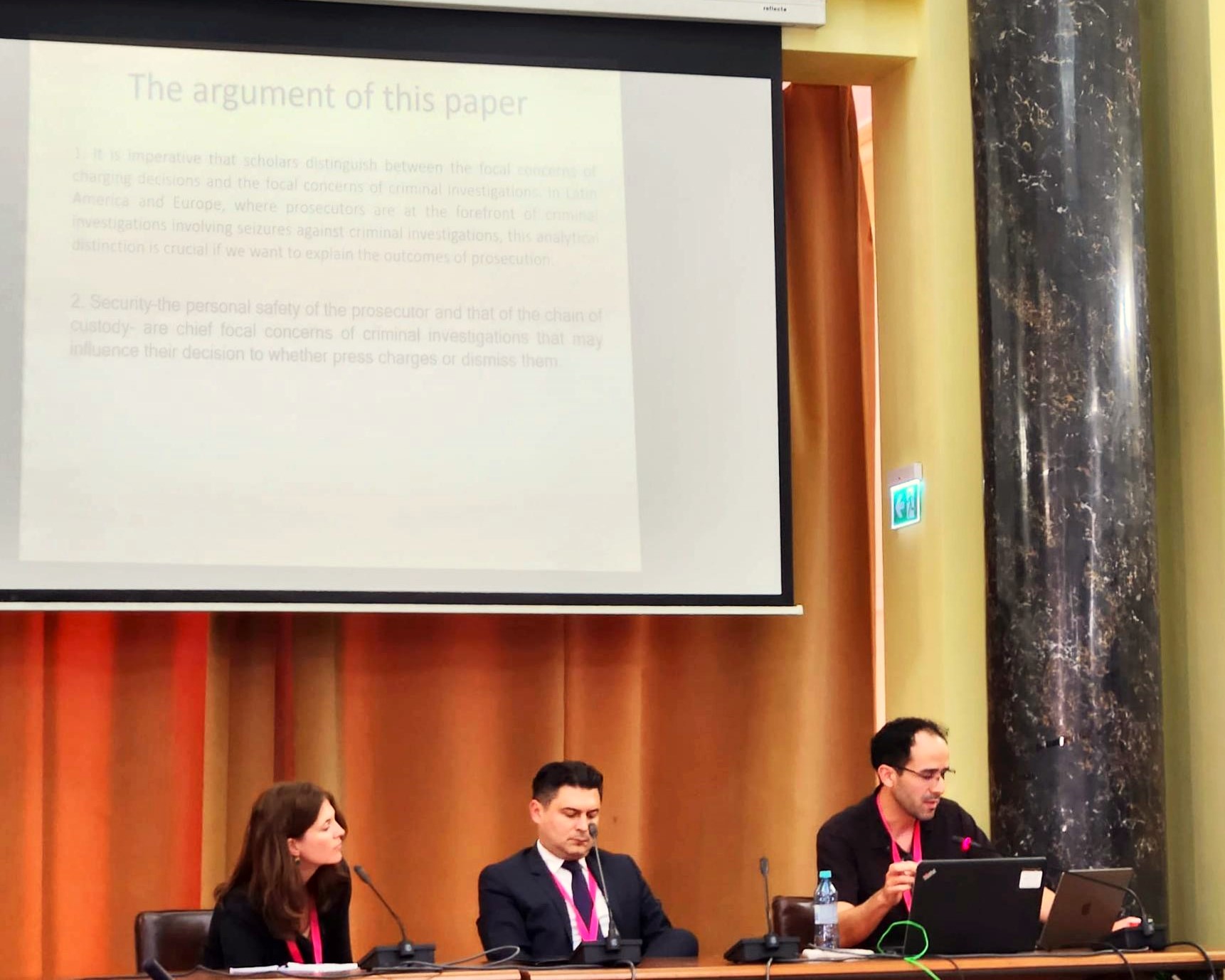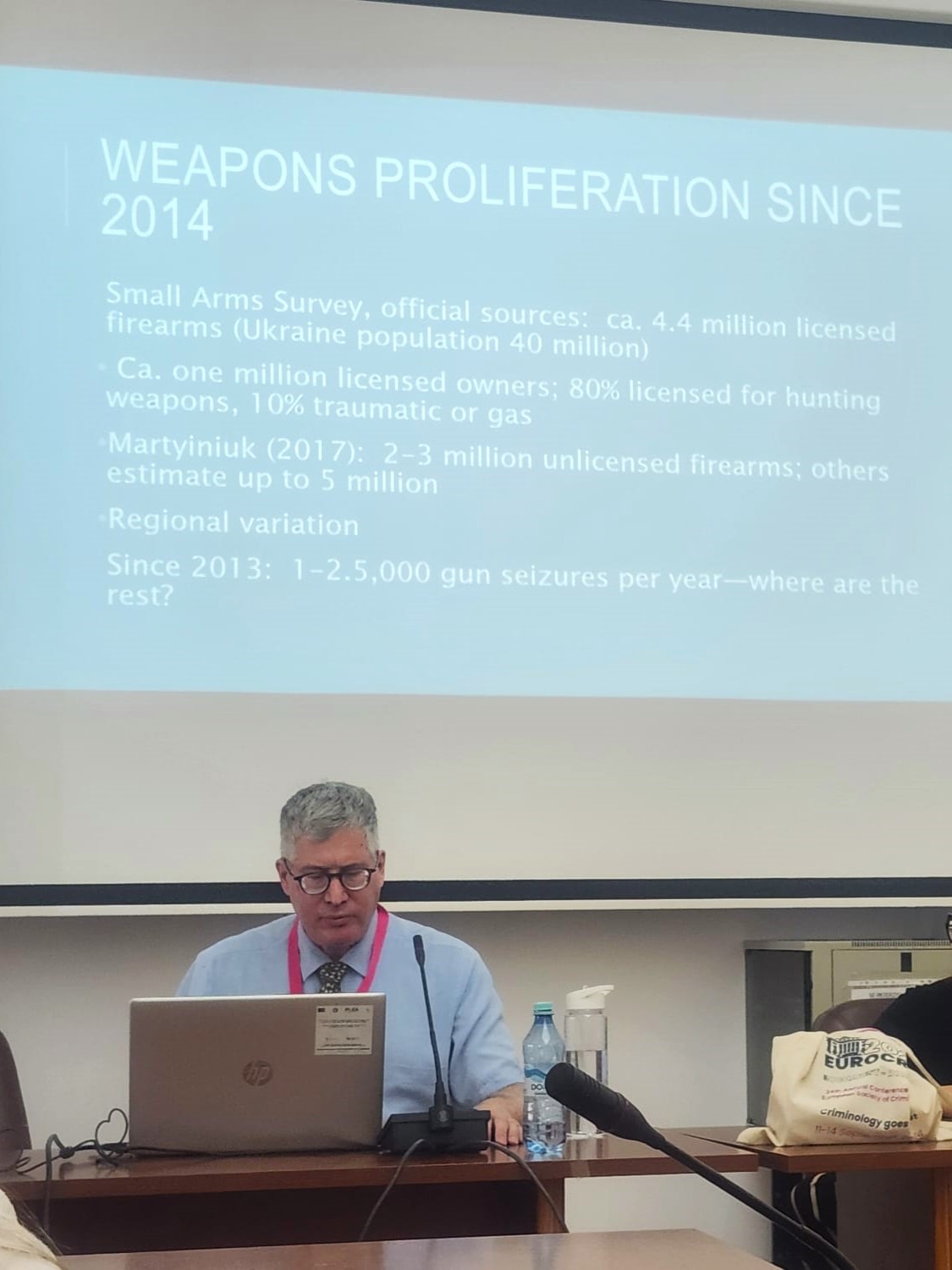CrimSL students and faculty returned recently from sharing their research at Eurocrim 2024 "Criminology goes East," the twenty-fourth annual conference of the European Society of Criminology.
The conference took place September 11-14, 2024, in Bucharest, Romania. The final schedule and program are available here.

PhD student Lauren Borders (Supv: Professor Kelly Hannah-Moffat) presented a paper on September 12, 2024 at a "Women in prison" panel session of the Gender, Crime and Justice Working Group on the topic "Crime Correlates/Gender and Crime." The session was chaired by Loraine Gelsthorpe, professor at the University of Cambridge and co-chair of the Gender, Crime and Justice Working Group.
Paper: "A Paradigm Shift Missed: The expanding incarceration of women in an age of drug decriminalisation" by Lauren Ivy Borders,University of Toronto and Erika Chabén Cabrera, University of Oxford.
Abstract: In recent decades, countries around the world have attempted to navigate away from a punitive ‘war on drugs’ framework to implement non-prohibitionist drug policies, such as decriminalisation. These policies are meant to bring about a paradigm shift in how illicit drug issues are addressed — reducing the role of the criminal justice system and protecting human rights. However, despite their intentions, women in several of these countries are increasingly incarcerated for low-level drug offences, and in many cases, still endure disproportionate and harsh punishment. Using Latin America as a regional case study, this paper examines the ways in which Global-North-inspired models of decriminalisation have failed to sufficiently consider the transnational and intersectional qualities of women’s relationship with drugs. Ultimately, these unique circumstances necessitate solutions beyond current models of progressive drug policy, which will need to be crafted and promoted by local voices at the international level.
Lauren says:
"Last Thursday, September 12th, I presented at the 24th Annual Conference of the European Society of Criminology in Bucharest, Romania. My presentation was titled "A paradigm shift missed: The expanding incarceration of women in an age of drug decriminalisation," and it is an ongoing project I am working on with my friend/colleague Erika Chabén Cabrera, a doctoral student at the University of Oxford. It discussed how a limited drug decriminalization framework in Uruguay has led to an increase in women being incarcerated for low-level drug crimes and highlighted a need for context-specific policy solutions beyond those offered by Europe and North America."

PhD candidate Diego Tuesta (Supv: Professor Matthew Light) presented a paper on September 12, 2024, at the "Emerging Issues in Sentencing Research" session on the topic "Social Control and Criminal Justice/Courts and Sentencing and Penal Decision Making (Sentencing and Penal Decisionmaking WG)" chaired by Andrei Zarafiu, Associate Professor, Faculty of Law, University of Bucharest.
Paper: "The fieldwork prosecutor in Peru: a sociological critique of the focal concerns perspective" by Diego Tuesta, University of Toronto.
Abstract: Here I will analyze the relevance and the limitations of the focal concerns perspective to understand the work of prosecutors in the Latin American civil law context. Focal concerns are an essential part of the toolbox a prosecutor uses; however, on its own, this framework fails to capture the moral problems and challenges that prosecutors experience in the Latin American context. To defend this point, I will draw upon evidence from two empirical case studies of line prosecutors who conduct investigations on human trafficking, illegal gold mining, and crimes associated with social protests in Peru. The fieldwork evidence shows that prosecutors must navigate working environments marked by resource scarcity, risks to personal safety, informal mechanisms of policing and prosecution, and a complex social division of labour. The cognitive tools and cultural and sociological resources prosecutors use exceed many of the behavioural patterns prescribed by the focal concerns perspective.

PhD candidate Jona Zyfi (Supv: Audrey Macklin) presented a paper at a panel of "Political and Social Discourses about Crime and Justice" on the topic "Perceptions of Crime and Justice/Political and Social Discourses about Crime and Justice (Crime, Science and Politics WG) on September 13, 2024. the session was chaired by Professor Aleksandras Dobryninas of Vilnius University
Paper: "Predicting risk: There is an 83% chance you are a criminal" by Jona Zyfi, University of Toronto.
Abstract: Recollections of a previous “golden age” of the “born criminal” have led to various attempts at re-imagining the changing nature and scope of criminal prediction, in turn leading to grim forecasts over the ubiquitous use of biotechnology and emphasizing the disastrous consequences for racialized persons. While these efforts have taken multiple forms and utilized different methods, they have historically been rooted in the idea of biodeterminism. This theory is generally understood to imply the universal and innate causal influence of one’s biological makeup, and minimizes (or flat out denies) the causal effects of environmental factors on individual (and social) behaviors. By tracing the history of biodeterminism and prediction, this presentation shows how new theoretical developments and applied technologies related to criminal prediction can be linked back to that same age-old underlying logic. Some of the most contemporary technological developments in this area include the use of artificial intelligence and machine-learning algorithms based on biometric and classification systems. Through an intersectional and structural-historical approach, and while theoretically engaging with themes in science and technology studies and critical race theory, I argue that similar to 19th-century physiognomy-based practices that attempted to predict future dangerousness and criminality (e.g. Lombroso), contemporary uses of biometric and predictive technologies, such as facial recognition software, have been rooted in a particular epistemic construction of the racialized body intrinsic to biodeterminism.

Professor Matthew Light participated in an "Author meets critics" session on September 12, 2024, on the book Investment of Criminal Proceeds into the Legitimate Economy: An Analysis of Italian and Russian Organised Crime in the UK Real Estate Market by Emanuele Sclafani.
Light also presented a paper on September 13, 2024, at the session "The impact and experiences of use of force and the promise of control mechanisms" on the topic "Social Control and Criminal Justice/Policing and Law enforcement (Policing WG)" chaired by Debora Piccirillo of the University of São Paulo.
Paper: "Gun control in contemporary Ukraine: control over the means of force in a conflict society" by Matthew Light, University of Toronto; Anne-Marie Singh, Toronto Metropolitan University; and Aaron Erlich, McGill University.
Abstract: Like other post-Soviet states, Ukraine inherited from the USSR a tradition of strict regulation of civilian possession of firearms. While long guns were permitted for hunting and recreation, short-barreled guns were basically prohibited. Before the full-scale Russian invasion of 2022, proposals for liberalization of this policy met with strong resistance from the Ministry of Interior and other government bodies and found little support with the public. In contrast, since the full-scale invasion, the government of Ukraine has moved toward legal ownership of more categories of firearms. Building on the co-authors' earlier research in other post-Soviet countries, the paper analyzes the sources of stability and evolution in Ukraine's gun control policy. It also presents original public opinion data that suggest the Ukrainian population has developed a more positive attitude toward the role of weapons in civilian society, while not endorsing total deregulation or vigilantism. The paper contributes to understanding of debates about control over force and the means of force in conflict societies, and the extent to which laws and public opinion in relation to gun control evolve as a result of major political shocks.


